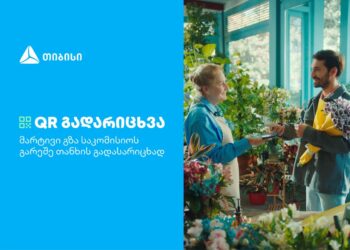The Women Career Mentorship Hub is a new project that provides one-on-one sessions to help young Georgian women navigate the job market post-graduation.
Sponsored by the British Embassy in Tbilisi and the Chevening Scholarship Alumni Fund, this project aims to support women in the third or fourth year of their bachelor’s degree, or those who recently graduated in two or less years. Irina Mamulashvili is one of the co-organizers and the international relations specialist for the project. According to her, the project helps by discussing challenges, opportunities, and aspirations, developing confidence in women, making them aware of their intended industry, developing resumes, CVs, motivation letters, interview techniques, and more.
The project began in July and will run until January 2025. It was started by four Chevening alumnae, Irina Mamulashvili, Pikria Elizarashvili, Irma Matoshvili, and Naiko Sadunishvili. The Chevening Scholarship is a program run in the United Kingdom that allows anyone to apply for a fully funded master’s program in the UK. Mamulashvili said the program highly focuses on networking, especially amongst alumni, which is how the Women Mentorship Hub came to be.
Through a Facebook group, the four women, all from different industries, met and decided to create a project that would be impactful in Georgia. Mamulashvili tells GEORGIA TODAY that since they didn’t have anything in common in terms of their backgrounds, they looked for what was missing in the country. She said they stumbled upon career mentorship, an established practice in the UK, which helps people with job direction and their experiences post-graduation.
“Women are the target of many gender-based stereotypes. Many people are experiencing these challenging first steps in their career journey, and we as students went through this and know how it works,” Mamulashvili says. “We know how challenging and important it is to get good guidance through this time.”
Many universities offer career days or one-time initiatives for jobs; however, Mamulashvili said there isn’t anything consistent. To apply for the program, students need to complete the required Google Form application that has technical questions and priority fields such as STEM, IT, and AI, business and finance, politics and international relations, media and communication, climate change and sustainable development, law, and gender studies. Afterward, the applications are considered, and 30 women are selected and paired with a mentor.
Mamulashvili tells us that there are around 16 mentors, and each will have two to three mentees to conduct individual, peer-to-peer learning sessions. The learning format will depend on various factors such as meeting in-person, or online, and how often. According to Mamulashvili, they want the project to be as flexible as possible, so all participants are comfortable.
All mentors are volunteers and previous recipients of the Chevening Scholarship. This is to give back to Chevening’s ideology of forming connections between people. Mamulashvili said all mentors have been in their career field for at least a few years, allowing them to share their experiences and relatable insights with current students and graduates.
“We’ve had a great amount of people show their interest in becoming mentors, which is great because we see that they still want to share and transfer their knowledge, skills, and experiences to empower other women,” Mamulashvili tells us.
The project aims to help those most vulnerable through career searches and development, which is why Mamulashvili says they will have 50% of participants from regions across Georgia. She says these students in particular may need more mentorship, and that they are not looking for those who already have experience in an industry, but those who are motivated and ready to face challenges.
Khatuna Goguadze is a mentor for the project, an educational neuroscientist, and co-founder of Kaikona, a space that conducts workshops for people to focus on personal growth and compassion for themselves. She graduated as a Chevening Scholar alumnae in 2022 from the University College of London and Birbeck University, where she studied interdisciplinary studies in human behavior, education, and psychology. She said she applied for the Chevening Scholarship two times before she was finally accepted.
Through her years of study, Goguadze says she realized that “education is just a tool, not an end goal.” As part of her scholarship requirements, she had to do a follow-up assignment after her program, of which she decided to translate an introduction neuroscience education book from English to Georgian. She said this was the most solid way to share her knowledge to ensure others would gain from it.
“In life, you can have a lot of experiences and grow in the sense of training and professionally, but you don’t really feel fulfilled unless you can contribute and give away what you have learned,” she says.
After conducting a workshop for girls in STEM, Goguadze said she received various emails from girls who were interested in pursuing STEM or the field of science. Goguadze tells us she saw clarity in this, that the girls were seeing themselves achieving a career in the field, even though it is not heavily supported.
According to Goguadze, the Women Career Mentorship Hub lets her talk about her field from a woman’s perspective and as a mom, showing the differences between women and men who go through the same thing.
For Goguadze, she partly sees this program from an evolution perspective. She explains a theory where people are standing, without being able to see what’s in front of them, and there’s no tree to climb for a higher view. Therefore, the people support each other by standing on each other’s shoulders and telling one another what they see. Through the mentorship program, metaphorically, Goguadze says they are helping young women by letting them stand on their shoulders.
“We, as mentors, will ground space for the women,” Goguadze says. “Mostly in Georgian culture, women get to be the caretaker, and it’s okay to do that too; I’m doing it, and I love my son, but there are more things you can experience and see in life. We can be the shoulders for them that they might not have.”
The mentorship program will run from October to December, with a closing ceremony at the British Embassy. Applications for the program run until September 22 and can be found on the project’s Facebook page. At the moment, the project has a definite end in January, but co-organizer Mamulashvili says they are hoping for further partnerships and donors so the project can continue with a larger number of applicants.
By Shelbi R. Ankiewicz














